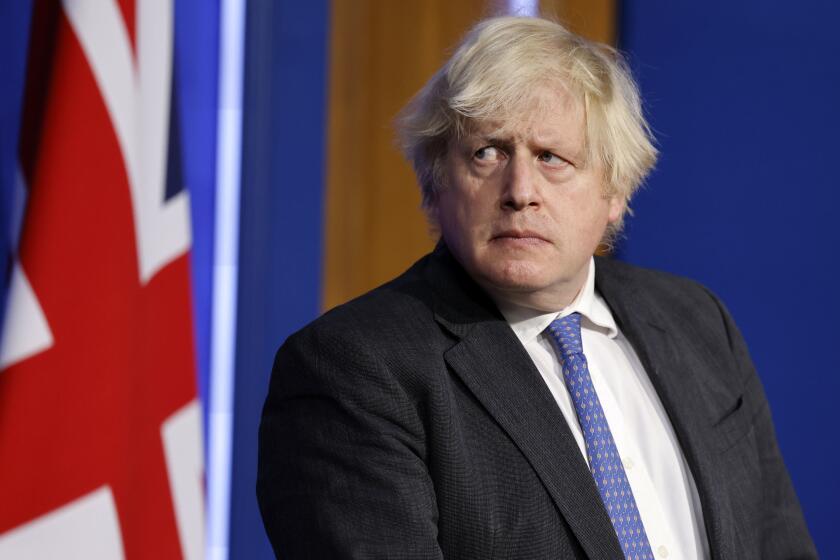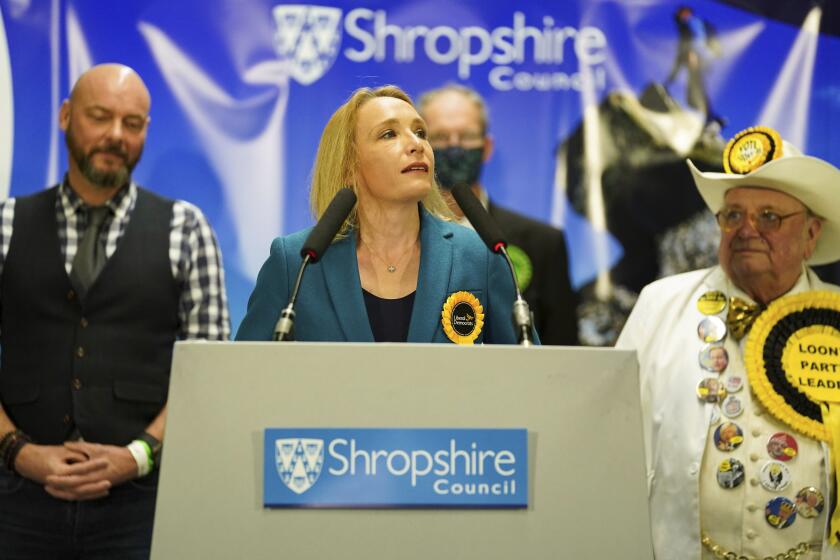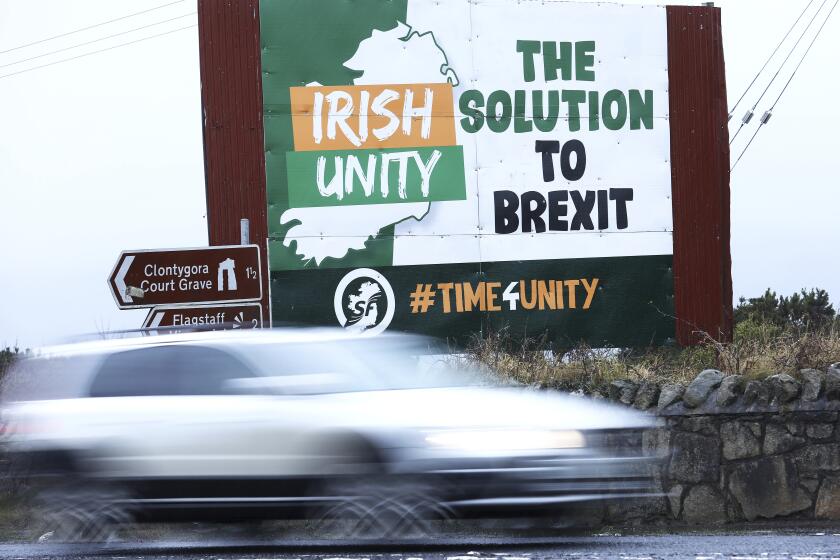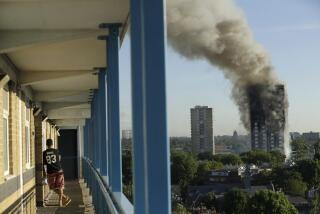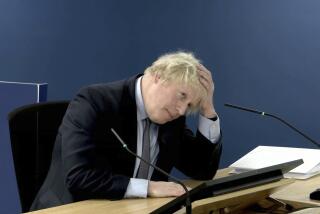‘Man without shame’ — opponents castigate British leader over partial ‘partygate’ findings
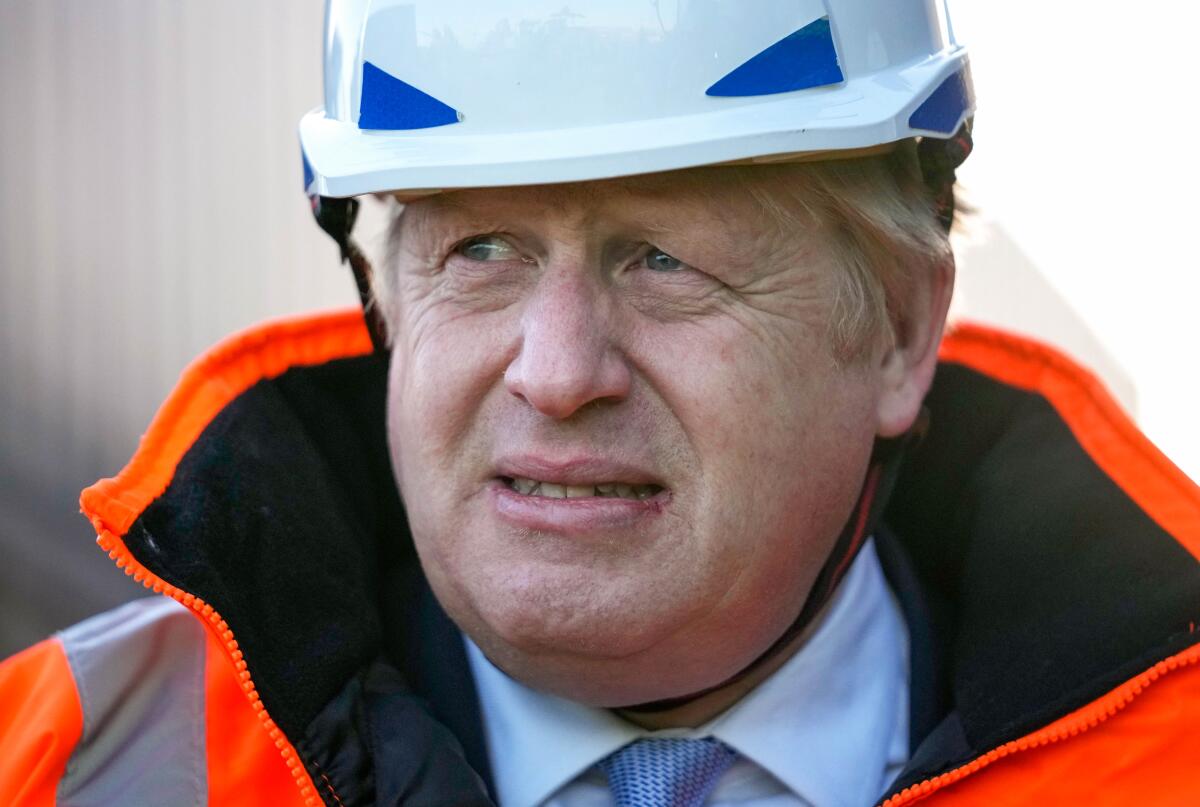
LONDON — Yes, I’m sorry. No, I won’t go.
That, in essence, was British Prime Minister Boris Johnson’s message to furious lawmakers who excoriated him after a partial official report on pandemic partying at Downing Street described leadership failures, a culture of excessive drinking and a cavalier attitude in the face of prolonged national sacrifice.
At a lengthy, raucous session of Parliament following the partial release of the findings, Johnson repeatedly apologized for what he termed misjudgment, and insisted he had not intended any insult to millions of Britons who adhered to strict limits on social gatherings and other daily activities as the coronavirus was sweeping the country.
But the 57-year-old prime minister insisted he would not resign, saying any action would be premature until the conclusion of a Scotland Yard investigation into whether laws were broken — a probe that could take months.
The British prime minister is famous for his ability to skate away from scandals large and small. But this one, over pandemic gatherings, might stick.
Even in truncated form, the interim disclosures in the report by senior civil servant Sue Gray were damning. Though she did not directly implicate Johnson in any wrongdoing, the report said there had been a “serious failure” on the part of his administration to adhere to standards of general and governmental responsibility.
At the parliamentary session, the British leader —
appearing in his customary state of semi-dishevelment, with rumpled jacket and untamed hair — toggled between open defiance and expressions of remorse.
“I get it, and I will fix it,” he said, promising largely unspecified reforms at Downing Street, the prime minister’s office and residence, and other spheres of his government.
The most withering criticism came from the political opposition. Labor Party leader Keir Starmer told the House of Commons that Johnson “took us all for fools,” calling him “a man without shame.”
“He held people’s sacrifice in contempt,” Starmer said. “He showed himself unfit for office.”
Several members of Johnson’s Conservative party joined in lambasting the prime minister. Because he holds a large parliamentary majority, it is Conservatives — not Parliament as a whole — who will determine his fate.
The scandal represents the gravest threat yet to Johnson’s premiership, drawing far greater public opprobrium than his handling of Brexit, the messy departure from the European Union, or of his government’s sometimes uneven performance during the pandemic, which has killed nearly 160,000 Britons.
British press reports in recent weeks have alleged that during a 20-month period, Johnson’s aides and staff — with him present on at least two occasions — engaged in more than a dozen sometimes-rowdy gatherings at Downing Street that flouted rules set forth by his own government.
Britain’s conditional authorization of Merck’s COVID-19 treatment pill gives the country another weapon in the fight against the pandemic.
But Monday’s events did not appear to represent a defining moment in the scandal. Many observers think Johnson —–who has repeatedly demonstrated a keen instinct for political survival — still stands a reasonable chance of remaining in office, in part because of the drawn-out timeline for the Scotland Yard investigation and in part because of external events like the crisis in Ukraine.
Parliamentary allies sought to put the spotlight on Johnson’s leadership role in the Western response to threatening moves by Russian President Vladimir Putin, who has massed more than 100,000 troops near Ukraine even while insisting Russia does not plan to invade. Johnson had to put off a planned phone call with Putin to attend the parliamentary session, his aides said.
The loss of a seat held by the Conservative Party for about 200 years is being seen by many as a referendum on British Prime Minister Boris Johnson.
The findings published Monday related to only four of the 16 social events Gray investigated. Disclosures regarding a dozen other parties were held back at the request of the police, to avoid prejudicing Scotland Yard’s own investigation.
On Monday, police said they were studying more than 300 photos, and more than 500 pages of documents relating to the social gatherings in question, in an attempt to discover whether they involved significant breaches of the law.
Regardless of the legal outcome, Gray’s findings echoed some of the sense of moral outrage voiced by Britons over depictions of alcohol-fueled revelry at a time of such national suffering. The document pointed to “failures of leadership and judgment” at Downing Street at a time when ordinary Britons were being asked to stay home, speak with dying relatives only via screens and accept far-reaching curbs on their daily lives.
Breaking News
Get breaking news, investigations, analysis and more signature journalism from the Los Angeles Times in your inbox.
You may occasionally receive promotional content from the Los Angeles Times.
While most Conservatives remained silent, slipped away or sought to deflect attention to other issues during Monday’s session, a few members of the prime minister’s party turned on him. Senior Conservative lawmaker Andrew Mitchell announced that Johnson “no longer has my support.”
The pandemic’s toll and anger over Brexit in Scotland and Northern Ireland are fueling warnings that the United Kingdom could be headed for a breakup.
Another Conservative lawmaker, Aaron Bell, described faithfully abiding by the restrictions on his grandmother’s funeral in May 2020, which is part of the investigation’s timeline. Mourning her, he didn’t even have a cup of tea afterward with loved ones, he told fellow lawmakers.
“Does the prime minister think I’m a fool?” he asked.
Johnson’s predecessor as prime minister, Theresa May — in whose ouster he was instrumental — declared that the prime minister and his circle either “had not read the rules, or didn’t understand what they meant,” or “didn’t think the rules applied” to them.
“Which was it?” she asked tartly.
Special correspondent Boyle reported from London and staff writer King from Washington.
More to Read
Sign up for Essential California
The most important California stories and recommendations in your inbox every morning.
You may occasionally receive promotional content from the Los Angeles Times.
